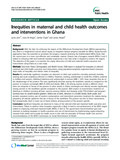Inequities in maternal and child health outcomes and interventions in Ghana

View/
Date
2012Author
Zere, Eyob
Kirigia, Joses M
Duale, Sambe
Akazili, James
Metadata
Show full item recordAbstract
With the date for achieving the targets of the Millennium Development Goals (MDGs) approaching fast, there is a heightened concern about equity, as inequities hamper progress towards the MDGs. Equity-focused approaches have the potential to accelerate the progress towards achieving the health-related MDGs faster than the current pace in a more cost-effective and sustainable manner. Ghana’s rate of progress towards MDGs 4 and 5 related to reducing child and maternal mortality respectively is less than what is required to achieve the targets. The objective of this paper is to examine the equity dimension of child and maternal health outcomes and interventions using Ghana as a case study.Data from Ghana Demographic and Health Survey 2008 report is analyzed for inequities in selected maternal and child health outcomes and interventions using population-weighted, regression-based measures: slope index of inequality and relative index of inequality.No statistically significant inequities are observed in infant and under-five mortality, perinatal mortality,
wasting and acute respiratory infection in children. However, stunting, underweight in under-five children, anaemia
in children and women, childhood diarrhoea and underweight in women (BMI < 18.5) show inequities that are to
the disadvantage of the poorest. The rates significantly decrease among the wealthiest quintile as compared to the
poorest. In contrast, overweight (BMI 25-29.9) and obesity (BMI ≥ 30) among women reveals a different trend there are inequities in favour of the poorest. In other words, in Ghana overweight and obesity increase significantly among women in the wealthiest quintile compared to the poorest. With respect to interventions: treatment of diarrhoea in children, receiving all basic vaccines among children and sleeping under ITN (children and pregnant women) have no wealth-related gradient. Skilled care at birth, deliveries in a health facility (both public and private), caesarean section, use of modern contraceptives and intermittent preventive treatment for malaria during pregnancy all indicate gradients that are in favour of the wealthiest. The poorest use less of these interventions. Not unexpectedly, there is more use of home delivery among women of the poorest quintile. Significant Inequities are observed in many of the selected child and maternal health outcomes and interventions. Failure to address these inequities vigorously is likely to lead to non-achievement of the MDG targets related to improving child and maternal health (MDGs 4 and 5). The government should therefore give due attention to tackling inequities in health outcomes and use of interventions by implementing equity-enhancing measure both within and outside the health sector in line with the principles of Primary Health Care and the recommendations of the WHO Commission on Social Determinants of Health.
